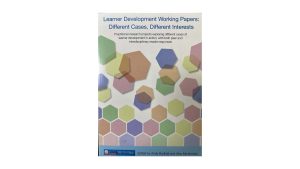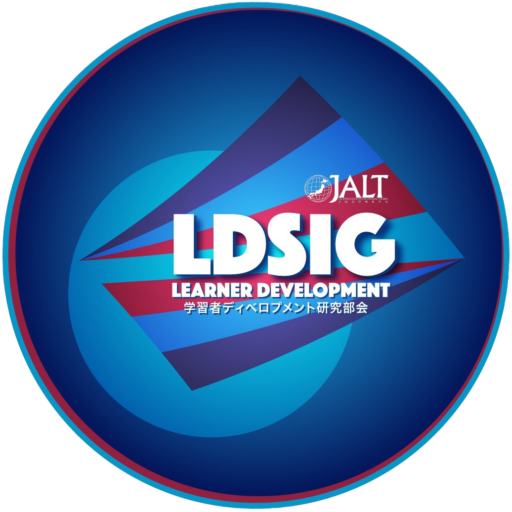Updated November 2023
Overview
Learner Development: Different Cases, Different Interests (Editors: Andy Barfield and Aiko Minematsu) (編集者:アンディ・バーフィールド、峰松愛子)was published online in December 2014 and can be accessed here. A small print run of 100 copies was completed in September 2016, and currently a few copies are kept by the Learner Development SIG for display and archive purposes.

Background to the Project
The starting point for this project was the Learner Development SIG Forum at JALT2012 where those taking part took a critical look at different cases of learner development. This writing project tries to break out of institutional boxes by attempting to make connections with perspectives and positions from a wide variety of disciplinary areas within education, other professional worlds, and/or in wider society. The final publication consists of nine chapters, with each chapter including a peer reader response and an interdisciplinary reader response. The peer reader responder has interests close to the author’s (s’) work and shares views on a specific chapter’s focus from a second language education perspective. The interdisciplinary reader responder in many cases is someone working outside the field of language education in Japan who can bring interesting and critical perspective to the main issues raised in the working paper. Thus, each chapter offers multiple, and unexpected, critical perspectives on the learner development issues that it deals with.
この論文集は2012年に開催されたJALT 学習者ディベロプメント研究部会フォーラムにて発表された事例を中心に”Learner Development: Different Cases, Different Interests”と題してまとめたものです。ここでは学習者ディベロプメントの動向を様々な角度からクリティカルに検証していくことで従来の学術的な枠を越え、ときには教育以外の関連分野の専門家や研究者の独自の見解を取り入れ特定の研究分野に縛られることなく、より幅広い学際的な視点をもつことを目的としています。この論文集は全9章で構成されます。各章には執筆者の論文と共に執筆者が依頼したピアーレビューヤ(peer reviewer)2名による省察があります。2名のうち1名は第二言語教育の分野で、とりわけ執筆者と近い研究分野の視点からコメントします。他の1名は 言語教育分野以外の専門家で、それぞれの観点から論文の主旨に対して意見を述べます。このようにインターアクティブな構成にすることで各論文がより多角的な視点で論じられ、幅広い視野で研究を見据えることを目的としています。
Chapters consist of:
- Co-Constructive Storying of Our Journey toward Autonomy Chika Hayashi, Guy Modica, and Yukiko Banno
- Autonomy or Fauxtonomy: Co-constructing Roles in a Learner Autonomy Course Martin Mullen, Chris Fitzgerald, Paul Crook, Phil Benson, and Mike Hennessey
- Inclusive Learning Environments and Code-switching Peter Cassidy, Mike Nix, and Mike Mahon
- Collaborative and Reflective Advising for Teacher and Learner Autonomy in a Japanese Junior High School EFL Education Context Hideo Kojima, Masuko Miyahara, and Atsushi Yoshinaka
- Teaching Everyone to Fish Was Never Going to Be That Simple: Challenges in Incorporating Learner Development into a Speaking Curriculum Nathan Ducker, J.D. Brown, and Mark Posselius
- Starting to Harvest in Larger Chunks: Exploring How Low-intermediate Learners Become Lexically Empowered Andy Barfield, Zorana Vasiljevic, and Mary Jo Pichette
- Connections between Facilitating Learner Autonomy, Language Proficiency, and the Teacher/Researcher’s Daily Grind Stacey Vye, Fumiko Murase, and Adriana Edwards Wurzinger
- Exploring the Principles of Exploratory Practice: Quality of Life or Quality of Learning? Alison Stewart, Robert Croker, and Judith Hanks
- Co-constructing Academic Literacy in an American Studies Seminar Hugh Nicoll, Joe Tomei, and Debra Occhi
